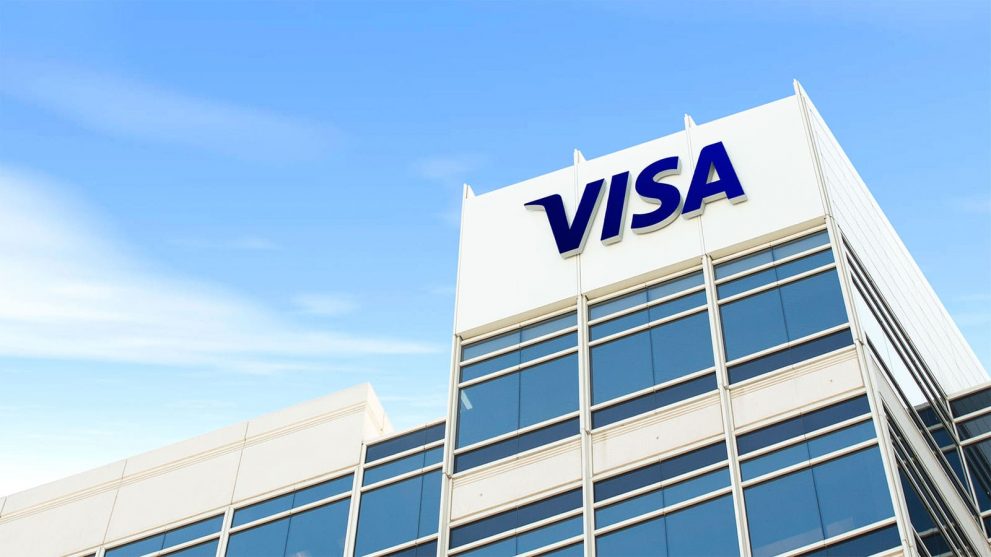
The future looks good for Visa (Visa Stock Quote, Chart, News, Analysts, Financials NYSE:V) in light of the continuing digital transformation, but the stock may be getting a bit ahead of itself, even with its recent pullback. So says Andrew McCreath of Forge First Asset Management, who says the recent share price drop is really a case of collateral damage.
“Visa is down again notwithstanding the company reported very solid results last week, and the guidance, the financial outlook that the company gave was also quite solid,” said McCreath, speaking on BNN Bloomberg on Tuesday.
“[In] my hedge funds at Forge First I’ve owned Visa for six years and we still own it. Fortunately we roll puts on it to protect the stock because it’s gotten a little rich for our own blood,” McCreath said. “But given the massive and better gains that we have in the stock we’ve been rolling puts, which have worked like a charm the last couple of days because it’s down [on Tuesday] and it got smacked [on Monday].”
“Now, why did it get smacked yesterday? It was not related to Square’s purchase of that buy now, pay later company out of Australia. It was actually related to financial results released by a competitor called Global Payments,” he said.
Payment tech company Visa had a productive 2020, where the stock gained 17 per cent for the year, but it was looking even better in 2021, returning 14 per cent and hitting an all-time high of $250 last week.
That was before the dip, which over the past couple of trading sessions has pulled the stock back down to $237 per share.
The company released its third quarter fiscal 2021 earnings last Tuesday, beating analysts’ estimates on the top and bottom, with adjusted earnings per share of $1.49 versus the Street’s call for $1.35 per share. (All figures in US dollars.)
Visa credited strong global payments volume, process transactions and cross-border volume for a 27-per-cent rise in revenue year-over-year, while the $1.49 in earnings was up 41 per cent from a year ago. Cross-border volume excluding intra-Europe was up 53 per cent year-over-year and process transactions were up four per cent sequentially and up 39 per cent year-over-year.
“Travel is starting to recover both domestically and in cross-border,” said Visa Chairman and CEO Al Kelly in the quarterly conference call. “Again, averaging across our top markets where we process versus 2019, domestic travel spending improved more than 20 points in Q3 over Q2. Globally, cross-border travel, excluding intra-Europe, versus 2019 improved 6 points in Q3 over Q2 and exited the quarter with June at 50 per cent of 2019.”
“Simply looking at the absolute levels, it was a record quarter for Visa with $2.7 trillion in payments volume and payment transactions per day globally, which is up 16 million per day from the last quarter and nearly 160 million transactions per day from a year ago,” Kelly said.
But even with the good news, Visa has sunk sharply this week, with McCreath pointing to Global Payments (NYSE:GPN), which released its second quarter financials on Monday. GAAP revenue came in at $2.14 billion for the fintech services company compared to $1.67 billion a year earlier and diluted earnings up to $0.89 per share compared to $0.12 a year prior.
“While Global Payments had a good quarter, the guidance was considered disappointing,” McCreath said. “In addition to that, their merchant growth numbers were considered underwhelming, especially related to competitor Fiserv of the previous week, and so that stock was down 11 per cent [on Monday] and down again [on Tuesday] to about $169.”
“[Compared to other payment processor companies], Visa has performed quite well over the past year,” McCreath said. “The interesting thing about Visa is the transition to digital is actually bullish for these types of companies.”
The whole payments space is getting more attention with companies like PayPal and Square continuing to expand in the SMB territory. In total, fintech’s ability to reach consumers in new and useful ways should continue to take bites out of the traditional banking space.
“We like the fintech space. We think it’s going to be a secular growth story for a long time,” said Michael Binger of Gradient Investments, who spoke on CNBC’s Trading Nation in July. “The whole cash-injected digital, we think that’s a trend that will go for quite some time. Cash App for Square and Venmo for PayPal are going to continue to benefit this industry.”
“Visa and Mastercard continue to benefit as the economy opens up, and I think the next leg of growth for them is going to be that cross-border revenue when they open up internationally and people start travelling there,” Binger said. “This is a great industry to be invested in.”
“My favourite name [in the payments space] is Visa,” said JC O’Hara of MKM Partners, speaking on the same CNBC segment. “Take a look at that chart. We are seeing Visa already consolidated and breaking out to new highs. Visa is showing leadership in the space.”
Leave a Reply
You must be logged in to post a comment.




 Share
Share Tweet
Tweet Share
Share




Comment